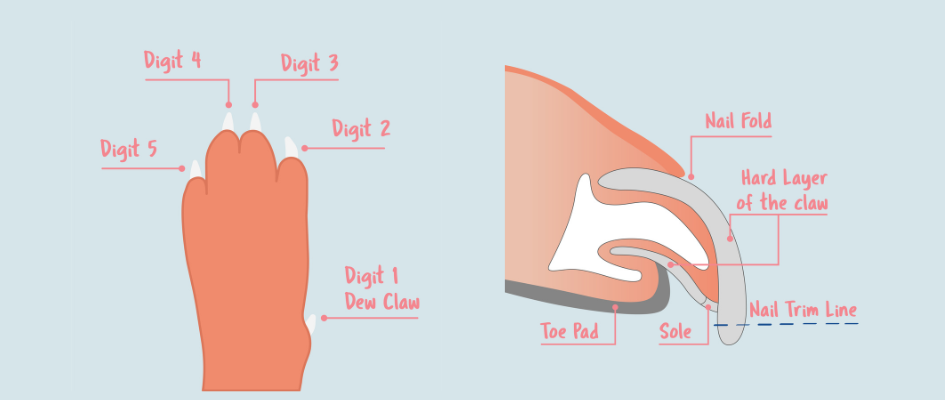Keeping your dog’s nails trimmed is an important aspect of pet care, but many pet owners struggle with the task. Nail cutting can be stressful for both the dog and the owner, especially if the owner is inexperienced or the dog has a nervous personality.
Taking your dog for regular walks on hard surfaces such as pavements will help to keep their nails short, although this isn’t enough in most cases. If your dog’s nails get too long, they’re at risk of being torn off on carpet, furniture or when outdoors.
In this short guide, we will show you the best way to cut your dog’s nails at home in a safe and stress-free way. Whether you’re a new dog owner or have been caring for a furry friend for years, we will provide you with all the tips and tricks you need to ensure a smooth and successful nail-cutting process.
Preparation
Clipping your dog’s nails can be tricky and is often very anxiety-inducing for your pet. There are a few steps you should take before you try to cut your dog’s nails for the first time to make the process much easier, especially if you have a puppy.
”My dog won’t let me cut their nails”
This is something we hear all the time. Getting your dog used to nail clippers is a huge step in ensuring a stress-free and safe grooming experience for both you and your furry friend. Here are some steps you can follow to help your dog get used to nail clippers:
- Start slow: Introduce your dog to the clippers gradually, letting them sniff and inspect the clippers before any actual clipping takes place. This will help them feel more comfortable with the tool.
- Positive reinforcement: Reward your dog for good behaviours, such as allowing you to touch their paws or letting you hold the clippers near their paw, with treats or praise.
- Practice touching paws: Regularly handling and massaging your dog’s paws will help them become comfortable with having their paws touched and manipulated.
- Short clipping sessions: Begin with short clipping sessions, slowly increasing the duration as your dog becomes more comfortable. This will help them adjust to the sensation of having their nails trimmed.
- Patience: Getting your dog used to nail clippers can take time, so be patient and never force the process. If your dog becomes distressed, stop and try again another time.
What you’ll need…
- Pet nail clippers: It’s important to use sharp nail clippers, and best to use those specifically made for pets. You can use human clippers if they’re sharp, but don’t use human nail scissors.
- Good lighting: Cut your dog’s nails in a room that is well lit. This is so you can see where to make the cut and avoid hitting “the quick”, which is the sensitive part of the nail that contains nerves and blood vessels. Catching this can cause bleeding and pain.
- A partner: If your dog is particularly nervous or resistant to having their nails clipped, it can be useful to ask someone to help you. This could be to support the restraining of the dog or keeping them calm.
- Lots of treats: Have a supply of treats on hand to reward your dog for being a good boy/girl throughout the session! This is vital for positive reinforcement.
It’s important to note that if your dog’s nails are growing into the skin or they are particularly anxious or aggressive, you shouldn’t attempt to clip them yourself. In a scenario like this, it’s best to contact your vet.

How to clip your dog’s nails: step by step
- Get your dog comfortable: Make sure your dog is relaxed and comfortable and give them plenty of praise and treats to help them feel at ease.
- Position your dog facing away from you: The person holding the dog should have one hand cradling the head and the other reaching over the dog’s shoulder to extend the leg, using the pressure of their arm to help calm the dog’s body. Hold the leg up around the elbow. It is important that you both feel comfortable that your dog is not at risk of biting you or your partner.
- Examine your dog’s paws: Take a close look at your dog’s paws and get familiar with their nails. Look for “the quick”, the pink part of the nail that contains nerves and blood vessels, and avoid cutting it.
- Start slow: Start with just one or two nails at a time, taking each, in turn, to allow your dog to get used to the process before proceeding. Press down near the nail bed to make it more visible.
- Make the cut: Hold the clippers at a 45-degree angle, and cut the nail just before the quick. If you accidentally cut the quick, use a piece of kitchen towel to apply pressure to the area. Any bleeding should stop after approximately five minutes, but if it continues, contact your vet.
- Reward your dog: After each successful cut, reward your dog with praise and a treat. This will help build a positive association with the nail-cutting process.
- Repeat: Repeat the process with each nail, and be sure to take breaks if your dog becomes uncomfortable or restless.
If you are in need of further advice or are concerned your dog may bite you during the nail clipping, book an appointment with your local Goddard vet practice or get in touch with our Central Clinical team at 020 8506 9944.
